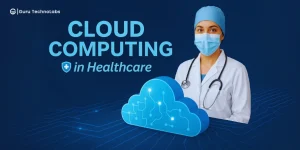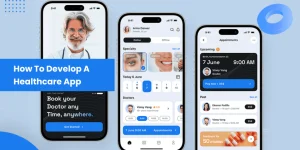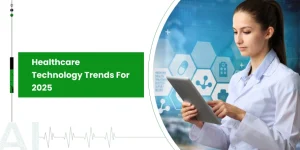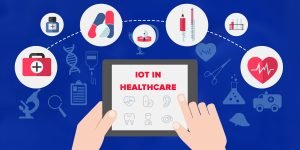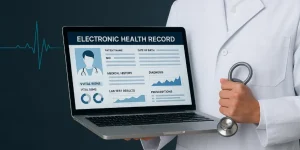How is AI Used in Healthcare Industry: Innovations and Benefits?

Artificial Intelligence (AI) and related technologies are already applied in many industries and businesses, and the healthcare industry is no exception. Different types of AI are utilized in care and life science companies, offering vast potential and transformative capabilities.
AI improves and simplifies the processes of medication for doctors, nurses, and health administrators by performing tasks that are time-consuming and cost-effective. However, extensive research and development are still ongoing, with much progress yet to be made.
The increasing number of datasets and advancements in machine learning algorithms are helping to enhance the application of AI in healthcare industry.
In this article, we will explore AI in healthcare industry, including its types, uses, benefits, innovations, and real-world examples of businesses who use AI.
But first, let’s review some market statistics related to AI in healthcare.
Statistics of AI in Healthcare Industry
- The AI in healthcare market is projected to be worth USD 188 billion by 2030 (Statista).
- According to HealthcareITNews, 86% of healthcare companies currently utilize AI.
- Robot-assisted surgery represents the highest application in the healthcare sector (Source).
- North America holds the largest share of the AI for Healthcare market (GrandViewResearch).
- 38% of Americans believe AI would lead to better health outcomes for patients.
As we can see, AI in healthcare is a booming industry and continues to do so with advancements in personalized healthcare, better diagnosis, cost reduction, and more.
Now, let’s explore some of the types of how AI is used in healthcare industry.
Types of AI Technology that Use in Healthcare Industry
Machine Learning
Machine Learning is one of the most common forms of Artificial Intelligence that is used in the healthcare industry.
- Around 40% of AI technologies in the healthcare market are based on machine learning.
Supervised learning, neural networks, and deep learning are key parts of machine learning that are used in AI applications.
Supervised learning is used in predicting the appropriate medication protocols for patients based on their specific conditions and treatment histories.
Neural network, a more complex structure of an AI, It is used to determine the likelihood of a patient developing certain diseases. With recognition of patient data, and neural networks, it can predict potential health risks. Also, it allows for early intervention and preventive measures.
Deep Learning is most usable for the radiologist. It involves structuring and interpreting thousands of neurons to analyze medical images that may not be seen by a human eye. Deep learning algorithms improve accuracy of image-based diagnostics. It aids to detect conditions such tumors and abnormalities.
ML also plays a crucial role in precision medicine. It analyzes genetic, environmental, and lifestyle data and identifies the most effective treatments for individual patients.
Natural Language Processing (NLP)
Natural Language Processing (NLP) in healthcare is used in applications such as analyzing large volumes of unstructured data, such as clinical notes, patient records, and research articles. With converting this data into a structured format, NLP improves the clinical documentation, and supports research and data analysis. Also, it increases patient interaction through chatbots and virtual assistants.
Rule-based Expert Systems
Rule-based expert systems need human experts and knowledge engineers to create a set of rules in a specific field of knowledge. This tech of AI in the healthcare field is commonly used to support clinical decisions.
However, When the dataset is increased and the number of rules grows, the rule-based system may start to break down and fail.
Physical Robots
Robots are more collaborative with humans these days and are increasingly being used in healthcare for tasks such as surgery to patient care. Robots are becoming more advanced with implementation of artificial intelligence in their system. It can perform tasks autonomously or assist healthcare professionals.
Applications like robotic surgery systems improve precision and control. While rehabilitation robots assist in patient recovery. And service robots streamline hospital operations by managing routine tasks.
Robotics Process Automation (RPA)
Robotics Process Automation (RPA) involves using software robots to automate repetitive and rule-based tasks. In the healthcare sector, RPA is a transformative technology that streamlines administrative processes, enhances operational efficiency, and significantly reduces the burden on healthcare staff.
RPA automates the tasks such as patient scheduling, billing, and data management. RPA ensures accuracy and boosts productivity. These software robots can handle high-volume, time-consuming tasks with precision, eliminating the risk of human error and allowing healthcare providers to dedicate more time to patient care.
Generative AI
Generative AI is new in the field but has some weightage with its working. In healthcare, Generative AI has several innovative applications. It can create synthetic medical data for research and training purposes. It enhances medical images for more accurate diagnoses, and generates detailed personalized patient reports.
Generative AI applications have more focus on research and development purposes. It helps to enhance research abilities, diagnostic precision, and patient interactions. However, understanding the AI app development cost is crucial for businesses aiming to leverage these advanced technologies effectively, particularly in healthcare applications that often involve different types of healthcare software.
AI is improving healthcare by offering fresh answers to old problems and leading to a more streamlined, successful, and patient-focused healthcare system.
Do You Want to Integrate this Technology in Your Healthcare App?
Get a free consultation on how you can transform your healthcare idea into
reality with this technologies. Our experts are here to help you in every step.
Use of AI in Healthcare Industry
AI and the healthcare industry work together to improve diagnosis and personalize treatment plans for patients.
Here, we delve into some ways AI is used in various ways in healthcare and how it significantly impacts human health.
Diagnostics and Imaging
Artificial intelligence can help detect diseases more accurately and quickly than humans. AI algorithms can analyze medical images like X-rays, MRIs, and CT scans very accurately. This can help doctors identify diseases earlier and more precisely than ever before.
For example, AI tools can find small differences in medical scans, which helps doctors diagnose conditions like cancer, heart disease, and brain disorders earlier.
However, Machine learning models, especially deep learning, are trained on large sets of medical images to identify patterns and abnormalities.
These computer programs keep getting smarter, so they can diagnose things more accurately. Using AI for medical tests and pictures doesn’t just make the results more accurate, it also helps doctors work faster, so they can help patients sooner.
Personalized Treatment Plans
AI can help create customized treatment plans by looking at patients’ specific information, such as their genes, medical background, lifestyle, and how they respond to treatment.
This approach makes sure to customize treatments to meet each patient’s needs. This leads to better results and fewer side effects.
Machine learning can help healthcare providers find valuable insights in large amounts of data. This can lead to more accurate treatments and better care for patients.
Predictive Analytics
In healthcare, predictive analytics uses AI to look at past and present data to predict future health issues. This helps healthcare providers to take action before problems occur.
Predictive analytics can help us find patients who might be at risk for long-term illnesses, having to go back to the hospital, or having bad reactions to medication.
AI can help predict disease outbreaks, patient deterioration, and other important events in healthcare. By using predictive analytics, healthcare professionals can make better decisions, improve patient outcomes, and allocate resources more effectively.
Virtual Health Assistants
Virtual health assistants, powered by AI, give patients instant access to healthcare info and support.
AI-powered tools can help with medical questions, remind you to take your medication, schedule appointments, and even support mental health. These virtual health assistants are always available, making it easier for patients to get involved and feel satisfied.
Artificial intelligence (AI) can work with electronic health records (EHR) to give tailored and precise information. Virtual health assistants help lessen the burden on healthcare workers and make the patient experience better.
Drug Discovery and Development
AI is speeding up the process of discovering and developing new drugs by making each step, from early research to clinical trials, more efficient.
As per the CBIinsights, Clinical trials for each drug cost about $1.3 billion on average, and only 10 percent of these drugs make it to the market. With the help of technology, AI is making this process faster by assisting in drug design. (Source)
AI can analyze lots of biological data to find possible new drugs, determine how well they might work, and improve the drugs.
However, AI-driven drug discovery uses advanced algorithms to analyze genetic information, molecular structures, and clinical trial data.
Artificial Intelligence can help pharmaceutical companies develop new drugs faster and cheaper. With AI, they can make safer and more effective medications, which is good news for patients.
10 Benefits of Artificial Intelligence in Healthcare
AI offers numerous benefits, here, we highlighted the ten benefits of how is AI used in healthcare industry.
- Improved Accuracy in Diagnosis
- Enhanced Patient Experience
- Reduction in Treatment Costs
- Streamlined Administrative Processes
- Real-Time Data Analysis
- Improved Accessibility to Care
- Better Management of Chronic Diseases
- Advanced Surgical Assistance
- Enhanced Research Capabilities
- Increased Operational Efficiency
1. Improved Accuracy in Diagnosis
AI technology helps doctors make more accurate diagnoses by analyzing a lot of data and finding patterns that humans might miss.
Machine learning programs can find signs of diseases like cancer early, which can help doctors intervene sooner and improve outcomes for patients.
2. Enhanced Patient Experience
AI helps make healthcare more personalized and efficient. It can go through huge amounts of data to find important information, making sure nothing important is missed.
It’s important to remember that a recent study revealed that 83% of patients consider poor communication to be the worst part of their healthcare experience. AI can help solve this problem by giving patients accurate and timely information, which can lead to better engagement and satisfaction.
3. Reduction in Treatment Costs
AI can help lower treatment costs by organizing resources more efficiently and making workflows smoother. By using predictive analytics, AI can pinpoint patients at high risk and in need of preventive care, which can help prevent expensive emergency treatments.
Additionally, Using AI to automate administrative tasks helps cut costs in healthcare, which makes it more affordable for both healthcare providers and patients.
4. Streamlined Administrative Processes
AI makes things easier by handling everyday tasks like scheduling appointments, managing payments, and processing insurance claims in healthcare settings.
AI-powered automation will help healthcare workers by reducing their workload, cutting down on mistakes, and speeding up tasks. It’s estimated that by 2025, this kind of automation could save the healthcare industry more than 200 billion hours of administrative work, making operations run much more smoothly.
5. Real-Time Data Analysis
AI allows healthcare providers to quickly analyze data in real time, helping them make well-informed decisions swiftly. These systems often rely on scalable infrastructure and secure environments, key features provided by cloud computing in healthcare.
AI systems can keep an eye on patient data all the time. They can spot any unusual things and let the doctors know about them before they become serious.
This ability is really important in places like intensive care units and emergency departments because quick actions can help save lives.
6. Improved Accessibility to Care
AI helps make healthcare more accessible by offering remote diagnosis and treatment services. However, AI in Telemedicine help to link patients with healthcare providers no matter where they are located.
This is really helpful in rural and underserved areas where access to good healthcare is limited.
By 2030, AI-powered telehealth services will be expected to make it easier for over 1.2 billion people worldwide to access healthcare.
These days, there are many companies working in the telehealth medicine industry that provide great services to communities. There are also many healthcare app ideas that startups or businesses can consider.
Also Read: How to Develop a Healthcare App
Do You Have a Telemedicine App Idea in Mind?
Our team of experts is ready to help you design, develop, and launch a
cutting-edge telemedicine app that meets your unique needs.
7. Better Management of Chronic Diseases
AI helps manage long-term illnesses by keeping an eye on things all the time and making treatment plans that are just for you. Devices with AI can watch your vital signs and symptoms, and give you and your doctor feedback immediately.
Taking proactive steps can help manage conditions like diabetes, hypertension, and heart disease better. This can reduce complications and the need for hospitalizations.
8. Advanced Surgical Assistance
AI is really important in high-tech surgery, especially in robotic operations. Robots powered by AI can do things with more accuracy and control than humans, which means they can do less invasive surgeries, help people recover more quickly, and improve the results of the surgery.
AI-powered virtual nursing assistants can help patients after surgery by providing guidance and monitoring their recovery.
A study discovered that 64% of patients liked using AI-powered post-surgery healthcare because it was dependable and easy to access.
9. Enhanced Research Capabilities
AI significantly enhances research capabilities by processing and analyzing vast datasets quickly and accurately. AI algorithms can identify potential drug candidates, predict their efficacy, and accelerate drug development. In medical research, AI helps uncover new insights and correlations, leading to innovative treatments and therapies.
10. Increased Operational Efficiency
AI boosts operational efficiency in healthcare organizations by optimizing workflows and resource management. AI systems can predict patient admission rates, manage staffing levels, and ensure the efficient use of medical equipment.
This optimization leads to cost savings and improved patient care. Hospitals that have implemented AI-driven operational systems report a 20% increase in efficiency and a 30% reduction in operational costs.
Understanding what AI means in the healthcare industry can be very beneficial. Now, let’s take a closer look at how Generative AI applications are helping the healthcare industry or may help in future.
Application of Generative AI in Healthcare Industry
Generative AI is a subset of artificial intelligence that generates new data from existing data sets. It’s making a big difference!
We’ll look at how generative AI changes healthcare by creating synthetic medical data and helping with medical research.

Creating Synthetic Medical Data
Generative AI can make fake medical data useful for training AI models without revealing private patient information. This synthetic data looks like real patient data, but it keeps sensitive info safe. This helps researchers and developers to test and improve algorithms.
This method is really helpful for rare diseases because there isn’t much real data available. By creating good synthetic data, AI systems can learn to see patterns and make good predictions, which can help improve how patients do.
Enhancing Medical Imaging
Generative AI helps improve medical imaging by creating clear, detailed images from low-quality scans. This technology uses smart algorithms to add missing information and enhance image quality, which helps doctors make more accurate diagnoses.
Additionally, generative AI can create different types of images to give detailed views of body parts and any issues.
This ability is really important for finding diseases like cancer early because having clear pictures of the inside of the body is very important for getting the right diagnosis and planning the best treatment.
Generating Personalized Patient Reports
Generative AI creates personalized patient reports by combining information from different sources like electronic health records, lab results, and clinical notes. These reports provide specific insights and suggestions for each patient, which helps improve the quality of their care.
Generative AI makes complicated medical information easier to understand, helping patients and healthcare providers make better decisions.
Customized reports help patients and doctors communicate better, which leads to a more collaborative healthcare approach.
Assisting in Medical Research
We think the main use of Generative AI in healthcare is in the research and development field. Generative AI helps in medical research by automatically generating ideas and finding possible research paths. It can go through vast amounts of data, find patterns, and suggest new directions for research.
This speeds up the research process, allowing scientists to concentrate on the most promising findings.
Furthermore, Generative AI can imitate clinical trials by forecasting results using artificial data. This reduces the time and money spent on regular trials.
Generative AI helps improve medical research, leading to the faster development of new treatments and therapies.
Real-World Examples of Businesses Who Use AI in Resolving Health Issues
Artificial intelligence (AI) is changing healthcare by providing new solutions to different health issues. Here are some real-world examples of companies using AI in healthcare to address important health problems.
IBM Watson Health
IBM Watson Health uses AI in healthcare to help diagnose and treat diseases more effectively. IBM’s AI platform, Watson, is really powerful and it’s helping healthcare providers a lot.
Watson Health’s oncology platform helps doctors find the best personalized treatments for cancer patients by studying lots of medical information and patient data.
This AI-driven approach makes sure that patients get the best and most current care based on evidence, which helps improve results and cut down on treatment times.
PathAI
PathAI is a company that uses AI technology to improve the accuracy of medical diagnoses in pathology. Their computer programs analyze images of tissue samples to help identify and classify diseases like cancer.
This helps pathologists make accurate diagnoses, which are really important for figuring out the best treatment for patients.
PathAI’s technology improves the accuracy of diagnoses and speeds up the process of reviewing pathology samples, which ultimately results in faster patient care.
Aidoc
Aidoc is changing the field of radiology by using AI to help understand medical images. Their AI programs can quickly spot important issues like bleeding in the brain, blood clots in the lungs, and fractures in the spine in CT scans.
Aidoc makes sure that patients who need urgent care get it quickly, which could save lives. Aidoc’s AI tools work well with radiology processes, making medical imaging departments more efficient and accurate.
Tempus
Tempus uses artificial intelligence to improve personalized treatment for cancer patients, specifically in the field of oncology. Their technology looks at both clinical and molecular data to offer tailored treatment suggestions.
Tempus uses AI to find important connections in big data sets that would be hard to spot on our own. This helps doctors choose the best treatments for each patient based on their genes and medical history, which can make their treatment work much better.
It shows how AI in healthcare can make treatments more specific and efficient.
These examples show how AI is used in healthcare to improve things like diagnosing illnesses and personalizing treatment plans. It’s really changing the game in medicine.
As AI technology gets better, it’s going to be used more in healthcare. This will bring new and creative solutions to tough health problems.
Ethical and Regulatory Considerations
AI is becoming more and more involved in healthcare, so it’s crucial to consider the ethical and regulatory aspects.
- Data Privacy and Security: It’s really important to keep patient data safe from being hacked or used in the wrong way. Making sure that AI systems follow data protection laws, like HIPAA in the US, is crucial for keeping patients’ trust.
- Bias and Fairness: It’s important to make sure that AI programs are designed to be fair and not biased. We should regularly check and update AI systems to make sure they provide equal healthcare results for everyone.
- Transparency and Explainability: It’s important for healthcare providers and patients to know how AI systems make decisions. Making sure that AI algorithms are transparent and easy to understand will help build trust and make it easier for everyone to make informed decisions.
- Regulatory Approval: Regulatory agencies must create rules for testing and approving AI technologies in healthcare. Developing clear guidelines and standards will make sure that AI applications are safe and effective.
Challenges and Opportunities
The use of AI in healthcare comes with both challenges and opportunities for the future. Let’s look at some of the challenges and opportunities of AI in healthcare industry.
- Integration with Existing Systems: Combining AI with current healthcare setups and processes can be complicated and expensive. But if done right, it can make things run smoother and help provide better care for patients.
- Training and Education: Healthcare workers will need training to use AI tools and understand their impact. Ongoing education and training will be important to help healthcare providers use AI effectively.
- Interoperability: It’s really important that AI systems in healthcare can talk to and work well with other technologies. This interoperability will let data and insights be shared across different platforms, making the healthcare system better overall.
- Cost and Accessibility: AI has the potential to lower healthcare costs in the future, but the upfront cost of AI technologies can be expensive. Making sure that all healthcare providers, no matter how big or small, can use these technologies will be a big challenge.
- Innovation and Collaboration: Innovations in AI will create new opportunities to enhance healthcare. It’s important for tech companies, healthcare providers, and regulators to work together to make these advances happen.
How Guru TechnoLabs Can Help You to Integrate With AI Technology?
Guru TechnoLabs is committed to assisting healthcare providers in using AI to enhance patient care, make processes more efficient, and foster innovation. Our AI integration and AI app development services cover strategy development, custom AI solutions, machine learning models, NLP and chatbots, data management, and ongoing support.
We help you every step of the way, from discussing and evaluating your needs to putting the AI system in place, testing it, rolling it out, and providing training. Our knowledge guarantees that the AI systems fit perfectly with your current setup, making operations smoother and reducing expenses.
Additionally, we specialize in using AI in mobile app solutions. This helps healthcare providers offer easy-to-use apps to improve patients’ engagement and care management.
When you work with us, you get custom AI solutions made specifically for your needs. With our extensive experience and dedication to your success, we help you use AI to improve healthcare delivery and achieve better results for patients.
Explore Your Healthcare App Idea With Guru TechnoLabs
Find innovative solutions, expert guidance, and cutting-edge technology.
Let’s transform your vision into a groundbreaking healthcare app.
Frequently Asked Questions
AI is transforming healthcare through various applications:
- Diagnostics and Imaging: AI examines medical images to quickly identify any irregularities.
- Personalized Treatment: Predictive analytics is used to make personalized treatment plans for patients.
- Virtual Health Assistants: AI-powered assistants help with keeping track of medications and setting up schedules.
- Drug Discovery: AI speeds up the process of finding possible new drugs.
- Administrative Efficiency: Automates tasks like billing and scheduling to make workflows better.
AI enhances patient care by providing more accurate diagnoses and personalized treatment plans. Machine learning algorithms can analyze vast amounts of data to identify patterns and predict patient outcomes, leading to early intervention and better management of chronic diseases. AI-powered virtual assistants offer 24/7 support, improving patient engagement and adherence to treatment plans. Moreover, AI streamlines administrative processes, reducing the burden on healthcare providers and allowing them to focus more on patient care.
Implementing AI in healthcare comes with several challenges. Data privacy and security are major concerns, as sensitive patient information must be protected. Integrating AI systems with existing healthcare infrastructure can be complex and costly. There is also a need for large, high-quality datasets to train AI models effectively.
Additionally, ethical and regulatory considerations must be addressed to ensure that AI is used responsibly and transparently. Finally, healthcare providers may require training to effectively use AI tools.
AI can be safe and effective in medical diagnoses when properly developed and validated. AI algorithms must undergo rigorous testing and validation to ensure accuracy and reliability. Regulatory bodies, such as the FDA, oversee the approval of AI-based medical devices and software to ensure safety standards are met. While AI can assist in diagnoses, it should complement, not replace, human expertise. Continuous monitoring and updates are essential to maintain the safety and effectiveness of AI systems in healthcare.
To get started with AI in your healthcare practice, begin by identifying specific areas where AI can add value, such as diagnostics, patient management, or administrative tasks. Consult with AI experts to understand the feasibility and potential impact of AI solutions.
Invest in high-quality data management systems to ensure you have the necessary data for training AI models. Partner with experienced AI solution providers, like Guru TechnoLabs, to develop and implement custom AI applications. Finally, provide training for your staff to ensure they can effectively use and manage the new AI tools.



